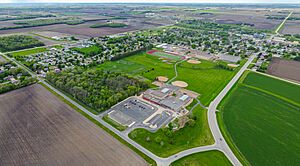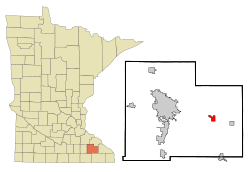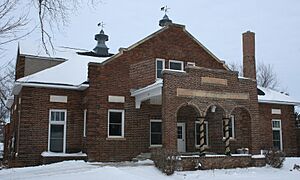Eyota, Minnesota facts for kids
Quick facts for kids
Eyota
|
|
|---|---|

US-14 and MN-42 run through town
|
|

Location of Eyota, Minnesota
|
|
| Country | United States |
| State | Minnesota |
| County | Olmsted |
| Area | |
| • Total | 1.69 sq mi (4.37 km2) |
| • Land | 1.69 sq mi (4.37 km2) |
| • Water | 0.00 sq mi (0.00 km2) |
| Elevation | 1,253 ft (382 m) |
| Population
(2020)
|
|
| • Total | 2,006 |
| • Density | 1,188.39/sq mi (458.78/km2) |
| Time zone | UTC-6 (Central (CST)) |
| • Summer (DST) | UTC-5 (CDT) |
| ZIP code |
55934
|
| Area code(s) | 507 |
| FIPS code | 27-20114 |
| GNIS feature ID | 2394722 |
Eyota (pronounced ee-YOH-tuh) is a city in Olmsted County, Minnesota, United States. The city's name comes from the Dakota word iyótaŋ, which means "greatest" or "most." In 2020, about 2,006 people lived in Eyota.
Contents
Eyota's Early History
Eyota was officially planned out in 1864. A post office opened in the city that same year. Eyota became an incorporated city on February 16, 1875.
First Settlers and Bear Creek
People started settling in the Eyota area around 1854. Benjamin Bear was one of the first. He arrived in 1853 to find a good spot with a spring that always flowed. He returned with his family the next year. A stream called Bear Creek starts from this spring. Today, a part of Bear Creek is held back by a dam, forming Chester Woods Lake. This dam helps protect nearby Rochester from floods.
Railroad and Business Growth
In its early days, Eyota was an important place for business and mail. It was also a key spot for shipping local grain and cattle. The city was located near a railroad junction. This junction had train lines going north to Plainview and south to Chatfield. This made Eyota a popular stop for travelers. The railroad was a major employer for people living in the area. This railroad later became known as the Chicago & North Western Railway.
Downtown and Early Stores
The streets of Eyota were planned on farmland owned by Milo Matteson. Samuel E. Everett, an investor from New York, helped with this. The main downtown area was built on the south side of the street. It faced the busy railroad yard. A large hotel called the Everett House was on South Front Street. Many business travelers stayed there.
Charles P. Russell was another early investor. In 1865, he built a store on the corner of South Front Street and Center Avenue. Russell stayed in Eyota and became an important part of the community. He bought grain from local farmers with his business partner, O.H. Jackson. Later, in 1910, Charles Russell worked with his son, Fred Russell, in banking and other businesses.
Many shops lined the street facing the railroad depot. These included hardware stores, lumber shops, and places that made wagons and harnesses. There were also drug stores, general stores, hotels, and several saloons.
Early Medical Care
Doctor Augustus Stinchfield was Eyota's first medical doctor. He came to town in 1873 after the local druggist, E.D. Dyar, invited him. Dr. Stinchfield built a large medical practice. He also had an office in St. Charles and used part of his home as a hospital. He married Martha Bear, the daughter of early settler Benjamin Bear. In 1892, Dr. Stinchfield left Eyota to join the famous Mayo Clinic in Rochester. He was the first non-family doctor to partner with the Mayo family.
Dr. Rollo C. Dugan took over Dr. Stinchfield's practice in Eyota. He was the son of local settler Elijah Dugan. In 1900, Dr. Dugan built the Eyota Hospital. It was an eight-bed facility located on Second Street.
Eyota's Geography
Eyota covers an area of about 1.69 square miles (4.37 square kilometers). All of this area is land.
The south branch of the Whitewater River flows through the northern part of the city.
Two main roads, U.S. Route 14 and Minnesota State Highway 42, run through Eyota. Interstate 90 is just south of the city.
Population and People
| Historical population | |||
|---|---|---|---|
| Census | Pop. | %± | |
| 1880 | 404 | — | |
| 1890 | 377 | −6.7% | |
| 1900 | 424 | 12.5% | |
| 1910 | 423 | −0.2% | |
| 1920 | 403 | −4.7% | |
| 1930 | 404 | 0.2% | |
| 1940 | 438 | 8.4% | |
| 1950 | 495 | 13.0% | |
| 1960 | 558 | 12.7% | |
| 1970 | 639 | 14.5% | |
| 1980 | 1,244 | 94.7% | |
| 1990 | 1,448 | 16.4% | |
| 2000 | 1,644 | 13.5% | |
| 2010 | 1,977 | 20.3% | |
| 2020 | 2,006 | 1.5% | |
| U.S. Decennial Census | |||
In 2010, there were 1,977 people living in Eyota. The city had 758 households and 542 families. The population density was about 1,170 people per square mile.
About 30.3% of the people in Eyota were under 18 years old. About 10.9% were 65 years or older. The average age in the city was 34.4 years. The population was almost evenly split between males (49.8%) and females (50.2%).
Education in Eyota
Eyota is part of the Dover-Eyota School District. This district serves students from both Dover and Eyota.
Notable People from Eyota
- Donald T. Franke, a Minnesota state legislator, was born in Eyota.
- Ralph L. Mayhood, another Minnesota state legislator, was also born in Eyota.
See also
 In Spanish: Eyota (Minnesota) para niños
In Spanish: Eyota (Minnesota) para niños
 | James B. Knighten |
 | Azellia White |
 | Willa Brown |



